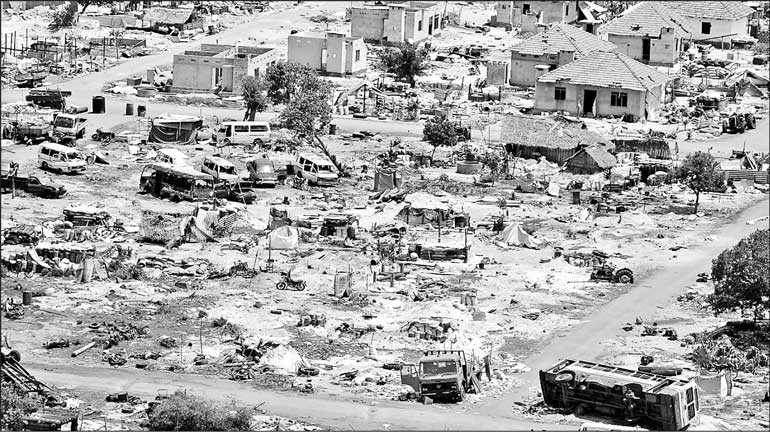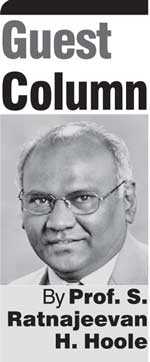Wednesday Feb 25, 2026
Wednesday Feb 25, 2026
Saturday, 29 February 2020 00:04 - - {{hitsCtrl.values.hits}}

The final days of our war: Zero or 40,000 casualties?
 It is Monday 25 February 2020 as I hunt-and-peck my computer keyboard at Colombo International Airport Terminal 12 awaiting my flight to New York with my wife to attend a family funeral.
It is Monday 25 February 2020 as I hunt-and-peck my computer keyboard at Colombo International Airport Terminal 12 awaiting my flight to New York with my wife to attend a family funeral.
I had been catching up on yesterday’s ‘The Sunday Times’. It announced that the Government, with cabinet approval, will withdraw from Resolution 30/1 of the UNHRC, solemnly co-signed by our Government in 2015. The UNP’s Sajith Premadasa has also promised to back the Government, following Gotabaya Rajapaksa, who promised during the presidential elections to protect soldiers who might be charged.
I cringe in fear because these moves threaten the lives of Tamils in this country. Effectively the two leaders of the two largest political groupings of Sri Lanka are jointly committed to letting off soldiers accused of war crimes. The Government is also protesting against the US travel restrictions imposed on Lieutenant General Shavendra Silva, the Commander of the Sri Lankan Army.
The two matters relating to soldiers and their commander are closely related. For if there were war crimes at Nandikadal and the beaches of Mullaitivu, then Army Commander Silva would be guilty under Command Responsibility. Worse, our Government would be guilty of a failure to uphold its responsibility to protect its own citizens. So, were war crimes committed towards the end of the war?
If yes, then the Government and the opposition are jointly promoting the fracturing of Mother Lanka. For who is the Tamil who would want to be a part of Sri Lanka if murderers of Tamils would be protected by the two major political groupings in the country? Anyone loving Sri Lanka as his or her motherland must rise in protest.
Somehow, intrinsic to withdrawing from the resolution is the blind belief that there were no war crimes committed towards the end of the war in 2009. Is it possible that no war crimes were committed towards the end of the war? Indeed not. We have the report of the UN Secretary General’s Panel of Experts. Their finding is that over 40,000 civilians were killed mainly because of shelling by Sri Lankan forces. Even our Government agreed to trying soldiers, which they never would have done if no crimes had been committed.
In 2015 when Resolution 30/1 was signed, it was clear to most of us that war crimes had been committed. Decent Sri Lankans heaved a sigh of relief that the Government would protect civilians and punish those responsible. With the Government effectively admitting that war crimes did happen, the restrictions of the silent were lifted. Up until then, many of them were scared to speak of their experiences. Lorry drivers, university staff, and people like Shanthi Sriskantharasa, MP (who lost her leg from Sri Lankan bombing) told me of the incessant lightning-like flashes as bombs fell all around them.
Renowned international human rights workers told us of the evidence they had. A New Zealand human rights judge told us at Jaffna Public Library that once an inquiry was agreed to, evidence began mounting like fruits falling off a shaken tree. UK’s Channel 4 brought to our homes the most horrific images from the war. The image of an infant with its head chopped open particularly stands out. No one would kill an infant child simply to make separatist propaganda.
The state is trying to drown us in a deluge of untruths and convenient doubts. We need to rely on our own intelligence and reasoning. We need confidence in ourselves to judge what the truth is; otherwise we risk upholding the implausible claims of politicians made for their short-term electoral gain at the expense of the unity and integrity of our motherland.
Nationalist politics
The Government and the Opposition, it seems clear to me, are playing nationalist politics, stoking communal hatred at the expense of the unity of Sri Lanka. Over the past four years after signing Resolution 30/1, the Government ramped up its propaganda and the newspapers have become silent. As a result, many decent Sinhalese have begun to question the 40,000 numbers. I have been told by many Sinhalese friends at work not to mention 40,000 dead, and that 10,000 was more like it. Many thinking Sinhalese seem to be in thrall to the propaganda being put out. As the state mounted its propaganda, even I in my weaker moments wondered if the reports are untrue after all.
Indeed no. That number of people could not have a reason to lie. Photographs shown on Channel 4 do not lie. Most photographs were given by decent Sinhalese soldiers who were repulsed by the most murderous carnage and necrophilia they witnessed.
Even President Gotabaya Rajapaksa despite his position on protecting the soldiers at all cost, has now suddenly admitted for reasons I do not understand that 20,000 disappeared and they are all dead.
Remember that at the end of the war, then-President Mahinda Rajapaksa solemnly claimed zero civilian casualties. Not a single Tamil civilian died, he said, because his troops went in with the gun in one hand and the human rights charter in the other. Presumably having been advised how laughable this claim is, the number then got bumped up to 10,000 to give it some credibility. Now it is 20,000. Who knows whether tomorrow it might be 40,000?
The new figure of 20,000 dead runs counter to what the Government had been building up till then. It is a big switch for the Government. Saliya Pieris’ Office of Missing Persons (OMP) in its first interim report recommended to the Government that it suspend state officials, police officers, and members of the armed forces who have been named as suspects or have been accused in criminal actions relating to abductions and enforced disappearances, pending the final determination of such cases. Would the OMP have made such a bold recommendation if there was no basis for it? I think not.
Even former Minister Champika Ranawaka, in threatening Tamils who voted for the TNA in the Northern Provincial Council in 2013, gave away that he knew of the massacres. For he said:
“If the Tamil National Alliance is preparing to challenge the Sri Lankan state, people and [their] sovereignty nationally and internationally using the political victory achieved in Northern Province, the Tamil society and their future generation will have to revisit Nandikadal lagoon.”
I respectfully ask Ranawaka, “Why? What happened in Nandikadal?”
Just last week Human Rights Watch reported ‘Intensified surveillance and threats’ against families of the disappeared. The Government with the cooperation of the opposition is suppressing the truth ensuring that no witnesses come forward. Unless the international community forces Sri Lanka to deliver justice to all communities, impunity for murders will reign supreme. We need foreign participation in delivering justice. We cannot consider this option because we are so racist and self-serving.
As the BBC reported this January, “The International Court of Justice (ICJ) has ordered measures to prevent the genocide of Rohingya Muslims in Myanmar (formerly Burma).[…] Thousands of Rohingya died and more than 700,000 fled to Bangladesh during an army crackdown in 2017.”
The non-prosecution and denial of the murders that we all know of, surely makes possible a case of genocide against us like in Myanmar. We must be conscious that there is already a strong case of genocide to be made against us. From the colonisation schemes like that at Weli Oya, the unending series of riots (that had no convictions), the numerous Government-commissioned human rights investigations that went ignored, is alarming the rest of the world with its parallels to other historic situations of ethnic cleansing.
We are not taking our responsibility to uphold our laws seriously, allowing the state to play politics and endanger all of us, making the analogy of the Pied Piper of Hamelin so real.
Those who want to divide Sri Lanka are promoting evil by giving impunity to alleged murderers. Those who love Sri Lanka are bringing out the truth. They are trying to preserve the unity and integrity of Sri Lanka by stripping away impunity. This takes courage and so they are the real heroes. One such person is Professor Asoka Ekanayake of Peradeniya.
The state is trying to drown us in a deluge of untruths and convenient doubts. We need to rely on our own intelligence and reasoning. We need confidence in ourselves to judge what the truth is; otherwise we risk upholding the implausible claims of politicians made for their short-term electoral gain at the expense of the unity and integrity of our motherland
Prof. Asoka Ekanayake: Epitome of Sinhalese decency
I had a chance recently to engage Sajith Premadasa by intervening in an email exchange between him and Ekanayake on affording protection to soldiers accused of war crimes. Here is what I wrote on 16 February to Premadasa and Prof. Ekanayake:
“If the country is to be together, upright Sinhalese like you should steadfastly demand justice.
“A fair trial with international observers will settle the issue as to whether crimes were committed by our troops. I have met many people who lived through the showers of shells in Mullaitivu.”
The facts regarding the difficult parts of our history need to be brought out and bravely confronted. It will help us move beyond politics, which shifts from moment to moment, and rebuild our country on stronger foundations of justice and unity which last for generations.